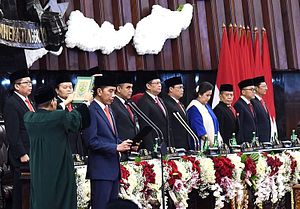The Diplomat author Mercy Kuo regularly engages subject-matter experts, policy practitioners, and strategic thinkers across the globe for their diverse insights into U.S. Asia policy. This conversation with Dr. Bridget Welsh – Senior Research Associate of the Hu Feng Center for East Asia Democratic Studies of the National Taiwan University; Senior Associate Fellow of The Habibie Center and currently Honorary Research Associate of the University of Nottingham Malaysia Asia Research Institute – explores the priorities and personalities that will shape Indonesia during President Joko Widodo’s second term.
Explain the rationale behind Indonesian President Joko “Jokowi” Widodo’s decision to select political rival retired general Prabowo Subianto as defense minister.
Jokowi has opted to bring his rival into the tent to reduce opposition within the parliament and government institutions, broadly, especially the security forces. This tactic was well honed during the Suharto era, when the former leader neutralized opposition through inclusion and an approach that was used by former president Susilo Bambang Yudhoyono (SBY) to foster cooperation. It speaks to the importance of concentrating power, reducing confrontation and the (re)emergence of party cartelization in Indonesian politics.
For Jokowi, it signals a shift in political orientation, away from the ordinary people or “orang kecil.” In bringing together the different oligarchic-led political parties, Jokowi has become part of the political elite. It is expected his family will emerge as a new political dynasty. The post-election conflict after the April 2019 election, triggered in part by elite competition, has returned to backroom accommodation.
What is the impact of this move on managing the rise of religious extremism?
The move is a tactical one to address the most serious threat to Jokowi’s tenure, the rise of religious extremism. As opposition, Prabowo was able to muster support from conservative religious groups and these were mobilized to oppose Jokowi’s leadership. The most known example of this was the attack on the then Jokowi-ally former governor of Jakarta, Basuki Tjahaja Purnama known by his Hakka Chinese name of Ahok, in the 2017 governor election for blasphemy. Now, the most senior elite using identity populist mobilization is part of the government, at the same time when religious affairs are being administered by a former retired military general Fachrul Razi. It is not a coincidence that some of the first measures of Jokowi’s second Cabinet focus on addressing “radicalism.”
Explain how Prabowo and Indonesia’s re-appointed foreign minister, Retno Marsudi, will strategically position Indonesia amid rising U.S.-China tensions.
Indonesia will remain inward-oriented, as the focus is on development through building infrastructure and expanding the digital economy. Jokowi is a domestic president, with his first term less focused on promoting foreign policy than his predecessor (SBY).
The person setting out Indonesia’s foreign policy is Foreign Minister Retno Marsudi, who has already outlined the five priorities for the second term – economic diplomacy, citizen protection, national sovereignty, regional and global leadership, and diplomacy infrastructure. She has proven to be a skilled diplomat, securing another term on the UN Security Council and steering an Indo-Pacific Strategy through ASEAN, maintaining both ASEAN centrality as well as stamping the Indonesia-led brand. She has served to bring back Indonesia’s leadership to regional affairs while maintaining Indonesia on the global stage.
Indonesia is among the most reluctant countries in Southeast Asia to choose sides in the deepening Great Power rivalry. It has opted to strengthen ASEAN and reaffirms the need for stronger regional ties. China’s Belt and Road Initiative has coincided with Jokowi’s domestic priority of building infrastructure, and this has improved relations between China and Indonesia, relations that were traditionally comparatively cooler than others in Southeast Asia. While China’s presence and investment has grown, it has provoked strong economic nationalist responses. China will be a major player in the Indonesian economy, notably in any possible development of the new capital, but this cannot be seen as an embrace of China’s role more widely, especially in the South China Sea. Indonesia expects to be treated respectfully as a “middle power” and will strongly oppose any perceived territorial infringement.
Identify the top three strategic priorities for Jakarta as China’s regional role and influence expands.
Indonesia seeks investment/capital for its infrastructure goals. It does so, however, on its own terms. China is having to adjust to conditions of high economic nationalism and greater confidence.
It also seeks stability. This has been challenging with ongoing trade disputes as well and encroachments in the South China Sea increasing tensions. Expect Indonesia to continue using balancing and hedging as it takes on a more prominent leadership role vis-à-vis China.
Finally, its priorities are not Jakarta, but increasing development outside of the capital. Chinese investment is playing a role in the periphery areas, which will likely increase.
What is your outlook for how Jokowi’s new cabinet will manage Indonesia-U.S. relations?
The first Cabinet-related obstacle, allowing the tainted defense minister on human rights violations, Prabowo, to travel to the United States, has been removed, but there are simmering tensions over trade and economic competition, to name just two issues. The “strategic partnership” set out in 2015 has yet to materialize as the bilateral relationship has moved into a more transactional mode. The U.S. has focused heavily on security relations, and, mistakenly, pressured Indonesia to take positions in the rivalry with China. There is little appreciation of how public perceptions of the U.S. have deteriorated under the Trump administration. Expect spats over trade, continued quiet cooperation in security, a strengthening of collaboration against religious extremism, and shared disinterest in promoting democracy and human rights.

































